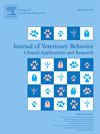暴露于二手烟中家养狗的行为改变:一项横断面研究
IF 1.3
3区 农林科学
Q4 BEHAVIORAL SCIENCES
Journal of Veterinary Behavior-clinical Applications and Research
Pub Date : 2025-05-01
DOI:10.1016/j.jveb.2025.04.008
引用次数: 0
摘要
人类和家养狗之间的密切关系强调了了解影响犬类行为因素的重要性,因为宠物狗的不受欢迎的行为可能会严重影响动物及其主人的生活质量。环境因素,如二手烟,可能会显著影响狗的行为。然而,这一领域仍未得到充分开发。虽然被动吸烟和人类行为改变之间的联系是有据可查的,但对犬科动物的类似影响的研究却很少。这项研究调查了304只家养狗,它们的主人既有吸烟者,也有不吸烟者,以评估接触二手烟可能带来的行为变化。每只狗的详细信息,包括性别、年龄、绝育状况和其他相关因素,都被仔细记录下来。主人们完成了一份量身定制的问卷,评估他们的狗暴露在香烟烟雾中的情况。使用波斯语翻译的狗性格问卷(DPQ)评估行为特征。统计分析显示,接触二手烟与六个关键行为特征的改变之间存在显著关联。具体来说,暴露于香烟烟雾中的狗表现出恐惧增加(OR=1.73),活动水平降低(OR=1.77),对人(OR=1.68)和其他动物(OR=3.40)的攻击性增强(OR=3.42),可训练性降低(OR=3.42)和焦虑升高(OR=7.25)。这些发现表明,与没有暴露在环境香烟烟雾中的狗相比,暴露在环境香烟烟雾中的狗出现行为问题的风险更高。本文章由计算机程序翻译,如有差异,请以英文原文为准。
Behavioral changes in domestic dogs associated with exposure to secondhand smoke: A cross-sectional study
The close relationship between humans and domestic dogs underscores the importance of understanding factors influencing canine behavior, as unwelcome behaviors in pet dogs may have serious effects on the animals' and their owners' quality of life. Environmental factors, such as secondhand smoke, may significantly influence dogs’ behavior. However, this area remains underexplored. Although the association between passive smoking and behavioral changes in humans is well-documented, there is a paucity of research exploring similar effects in canines. This study examined 304 domestic dogs belonging to both smoker and non-smoker owners to assess the potential behavioral changes associated with secondhand smoke exposure. Detailed information, including sex, age, neutering status, and other relevant factors, was meticulously recorded for each dog. Owners completed a tailored questionnaire evaluating their dogs’ exposure to cigarette smoke. Behavioral traits were assessed using a validated Persian translation of the Dog Personality Questionnaire (DPQ). Statistical analysis revealed significant associations between secondhand smoke exposure and alterations in six key behavioral traits. Specifically, dogs exposed to cigarette smoke demonstrated increased fearfulness (OR=1.73), reduced activity levels (OR=1.77), heightened aggression towards people (OR=1.68) and other animals (OR=3.40), diminished trainability (OR=3.42), and elevated anxiety (OR=7.25). These findings suggest that dogs exposed to environmental cigarette smoke are at a higher risk for behavioral problems compared to those not exposed.
求助全文
通过发布文献求助,成功后即可免费获取论文全文。
去求助
来源期刊
CiteScore
3.50
自引率
16.70%
发文量
107
审稿时长
325 days
期刊介绍:
Journal of Veterinary Behavior: Clinical Applications and Research is an international journal that focuses on all aspects of veterinary behavioral medicine, with a particular emphasis on clinical applications and research. Articles cover such topics as basic research involving normal signaling or social behaviors, welfare and/or housing issues, molecular or quantitative genetics, and applied behavioral issues (eg, working dogs) that may have implications for clinical interest or assessment.
JVEB is the official journal of the Australian Veterinary Behaviour Interest Group, the British Veterinary Behaviour Association, Gesellschaft fr Tierverhaltensmedizin und Therapie, the International Working Dog Breeding Association, the Pet Professional Guild, the Association Veterinaire Suisse pour la Medecine Comportementale, and The American Veterinary Society of Animal Behavior.

 求助内容:
求助内容: 应助结果提醒方式:
应助结果提醒方式:


